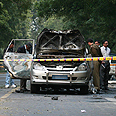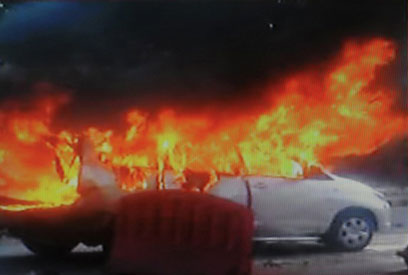The bombing in New Delhi and the terror attack foiled in Tabilisi are almost certainly part of a series of Hezbollah attempts – facilitated by Iran – to avenge the assassination of Hezbollah military chief Imad Mugniyah.
Mugniyah, who was the head of Hezbollah's military wing and a murderous terrorist, was killed by an explosive device planted in the headrest of the driver's seat of his jeep. Hezbollah blamed Israel for the assassination and its leaders, echoed by the Iranians, have publicly vowed to avenge his death.
Related stories:
It is also likely that the bombs placed in Israeli diplomats' cars were meant to signal to Israel that its diplomats were not immune to the modus operandi used to eliminate Mugniyah.
Intent aside, the execution was far less successful than the Mugniyah assaination four years and three days ago in Damascus. The bomb placed, discovered and defused in a Georgia Embassy employee's car was a clear operational failure; both because that bomb was placed in the wrong person's car, and because it failed to go off or was found beforehand.
In both cases, the devices were supposed to be triggered either by a timer or via remote control. But even the New Delhi device, which did go off, attests to the terrorists' failure: The target was most likely the Israeli diplomat and not his wife. She luckily escaped with only minor injuries, indicating that the device was ill-placed.
Work of amateurs
As for the identity of the perpetrators, they were probably not members of Hezbollah's special unit, or of Iran's Quds Force, but rather, locals belonging to the group's collaborator network.
To understand the situation in full, one must remember that only several weeks ago two major attempts to carry out terror attacks against Israeli targets were foiled – the first against Israeli tourists in Thailand and the second in Baku, the capital of Azerbaijan.
Those two attacks were orchestrated by experts and were prevented thanks to accurate intelligence. In both cases, the specialists were sent by Hezbollah and Iran: In Thailand the suspects were two Lebanese Hezbollah operatives – one of whom was caught and the other fled; and in Baku it was members of Iran's Quds Force who tried to recruit Azeris to assassinate the Israeli ambassador.
Those two attempts were preceded by at least five others over the past few years. Iran and Hezbollah eventually gave up on a flashy terror attack in favor of two simple ones, reminiscent of the kind used as payback in the underworld; simply because they could not get around the security and intelligence Israel – with the assistance foreign governments – has in place.
Security lapses?
That's the good news. The bad news is that Monday's attacks signal that neither Hezbollah nor the Iranians have any intention of shelving their plans for major revenge, that is, a high-casualty attack, as would befit vengeance for the elimination of an arch-terrorist like Mugniyah and the assassination of Iranian nuclear and missile scientists on the streets of Tehran.
At the same time, the attempted attacks attest to breaches and possibly even negligence in security arrangements at Israeli missions abroad. The fact that terrorists, and possibly non-professionals, managed to attach explosive devices to the vehicle of an Israeli diplomat attests to a grave security failure.
Such vehicle, even if it does not carry an Israeli flag, is marked with a diplomatic license plate bearing a number showing which embassy it belongs to. Hence, the perpetrators had no difficulty identifying the car, and that is a failure in and of itself.
In Tbilisi the situation is vaguer, and the failure may have taken place in securing the vicinity of the embassy. This could happen, as no human being can spot every detail during a patrol. However, this requires Israel as well as local authorities in countries hosting Israeli diplomatic missions to boost the level of security.
- Follow Ynetnews on Facebook
and Twitter


















